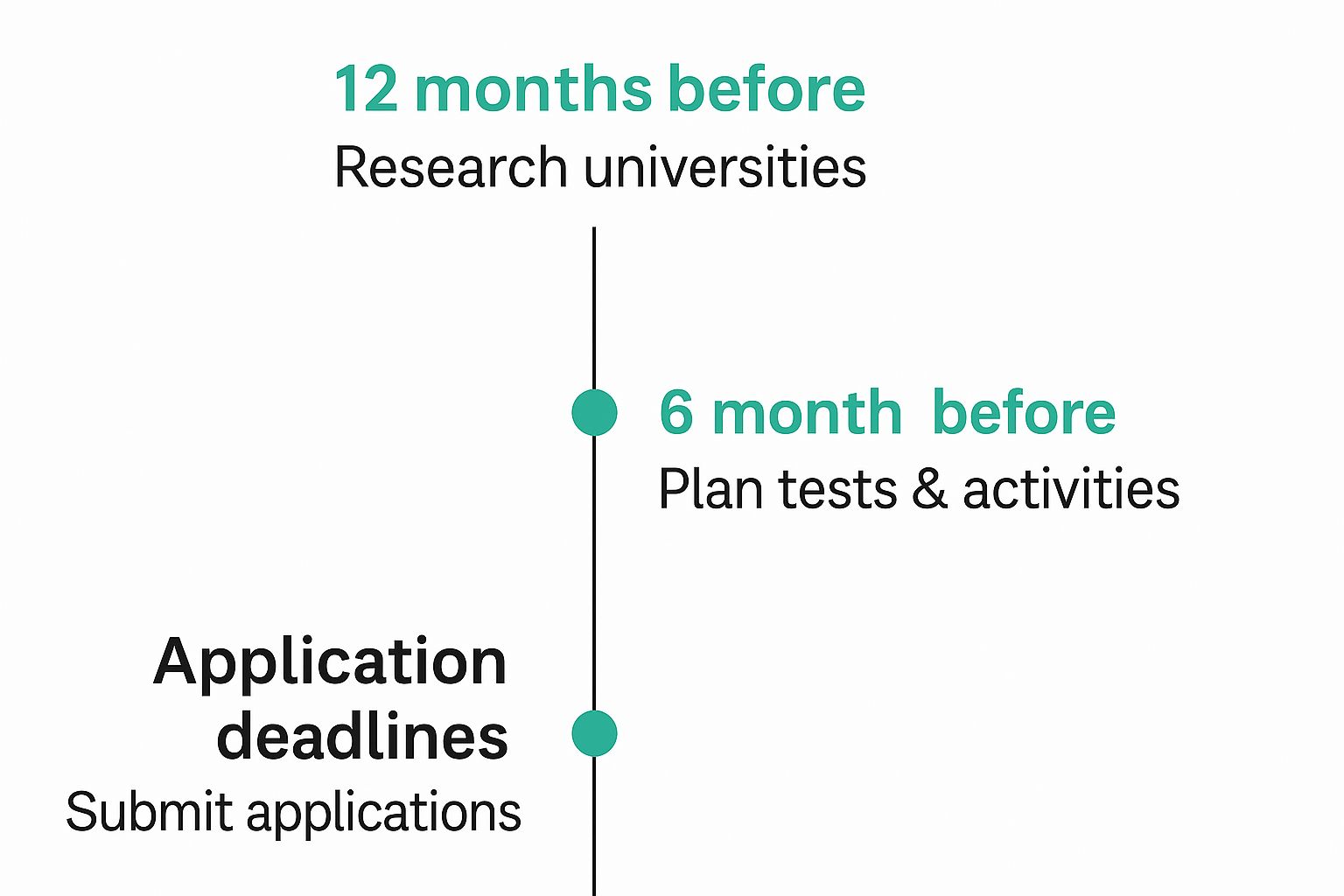
Getting into university is a huge, exciting step, but let's be honest—it can also feel like a massive undertaking. So, how can you stand out? The whole process really comes down to three things: finding the right course for you, putting together an application that shines, and making sure you hit the entry requirements. By breaking it down, it becomes far less daunting.
Your University Application Journey Starts Now
Figuring out the university application process can seem confusing at first, but a clear plan makes all the difference. This guide will walk you through everything, from that first spark of an idea right up to accepting your place. First, let’s get a feel for what’s happening in UK universities right now.
Competition is definitely on the rise. It’s predicted that the number of students applying to UK universities will jump by around 40% by 2025. To give you an idea, in 2024, over 757,000 people applied for roughly 565,000 spots. This means a well-thought-out, polished application is no longer a nice-to-have; it's essential for success.
Mapping Out Your Timeline
Good timing is everything. Trying to do it all at once is a recipe for stress. By spreading out the tasks over a year, you give yourself the breathing room to do each part well. Think of it as a marathon, not a frantic sprint to the finish line.
A well-planned application timeline is your secret weapon. It prevents last-minute panic and ensures every part of your application—from your personal statement to your references—gets the attention it deserves.
To give you a clearer picture, here is a simple table outlining the typical application cycle.
The University Application Timeline: A Quick Overview
| Stage | When to Start | Key Actions |
|---|---|---|
| Research Phase | 12-18 months before | Explore subjects, careers, and universities. Attend open days. |
| Application Prep | 6-9 months before | Start drafting your personal statement. Confirm your referees. |
| Submission | By the January deadline | Finalise and submit your UCAS application. |
| Offers & Interviews | February – May | Attend interviews/assessments. Receive and review offers. |
| Final Steps | May – August | Reply to offers. Arrange student finance and accommodation. |
This timeline shows that your journey begins long before you hit 'submit', with the most important research happening a good year in advance.

Understanding the Path Ahead
Knowing what’s coming up helps you stay one step ahead. Your path to university is made up of a few key phases, and each one builds on the last.
Here’s a quick look at what you’ll be tackling:
- Finding Your Fit: This is the fun part! It’s all about exploring different courses and universities to find one that genuinely excites you and aligns with your future goals.
- Checking the Requirements: Time for a reality check. You’ll need to dig into the specific grades, subjects, or qualifications needed for your chosen courses.
- Building Your Application: This is your moment to shine. You’ll be crafting your personal statement, asking for references, and filling out all the formal application paperwork.
- Preparing for What’s Next: Some courses, particularly competitive ones like medicine or law, might ask you to sit an admissions test or come in for an interview.
It’s also crucial to remember that A-Levels aren't the only way in. Many brilliant students wonder how to get into university without A-Levels, and the great news is there are plenty of excellent, well-respected alternatives out there.
Finding the Right Course and University for You

Choosing what and where you’ll study is easily the biggest decision you'll make at this point. It’s about so much more than just picking a subject you like; it’s about finding a course that truly excites you and an environment where you can see yourself living and learning for the next few years.
Getting this right is the foundation of a strong application. It all starts here. A bit of focused research now will help you move from a vague idea to a solid, confident plan of action.
Look Beyond the League Tables
It's tempting to dive straight into university league tables, and they can be a useful starting point. But please, don’t let them be the final word. While they offer a quick glimpse into things like student satisfaction or research prestige, they do not tell the whole story.
A university might be top of the charts overall, but its department for your specific subject could be just average. Instead, use the tables to get a general feel for different institutions, and then start digging a whole lot deeper.
A university’s ranking gives you a headline, but the course modules, teaching style, and student feedback give you the actual story. Focusing on these details is key to finding your perfect fit.
How to Research Course Content Effectively
Honestly, the single most important factor is the course itself. You’ll find two degrees with the exact same name—say, ‘Business Management’—can be worlds apart at different universities. One might be laser-focused on finance and analytics, while another prioritises marketing and HR.
Here’s what you need to look at very closely:
- Core vs. Optional Modules: What are the compulsory modules in your first year? More importantly, what optional modules open up in years two and three? Do they sound genuinely interesting and line up with your career goals?
- Assessment Methods: How are you actually graded? Some courses are 100% exam-based, which is great for some but a nightmare for others. Many use a mix of essays, project work, and presentations. Be honest about where your strengths lie.
- Teaching Staff: Take a moment to see who will be teaching you. A quick search of the academics in the department can tell you a lot. Are they involved in fascinating research? This often hints at the department's specialisms and passion.
Think about it this way: you want to study History. At University A, the course is heavy on ancient civilisations. But over at University B, their speciality is modern social history. A quick scan of the module list will instantly tell you which one is the right place for you.
Finding the Right University Environment
Once you’ve got a handle on a few courses, it’s time to think about the place. The vibe of a university and its location will have a massive impact on your happiness and success. Do you picture yourself thriving in a bustling city centre or in a quieter, self-contained campus?
Here's a quick breakdown of the different styles:
| Feature | Campus University | City University |
|---|---|---|
| Atmosphere | Often a self-contained community feel. | Integrated into the wider city, more independent. |
| Accommodation | Usually guaranteed on-campus for first years. | Often spread across the city; can be more varied. |
| Social Life | Centred around university clubs and student union events. | A mix of student life and the city’s public offerings. |
| Commute | Short walks between lectures, library, and halls. | May require using public transport to get around. |
There's no right or wrong answer; it’s all about what feels right for you. The best way to get a feel for a place is to visit on an open day. If you can’t make it, virtual tours and student vlogs on YouTube are the next best thing.
Building Your Strategic Shortlist
Okay, you've done the research. Now it’s time to pull it all together into a smart shortlist of five universities for your UCAS application. The key here is balance—you want to give yourself the best possible chance of getting offers you’re excited about.
Think of your five choices in three simple tiers:
- Ambitious Choice: This is your dream uni, the one that might feel like a stretch. You meet the entry grades, but it's at the top end of your predictions. It’s good to aim high!
- Realistic Choices: Pick about three universities where your predicted grades sit comfortably within their typical offer range. You should have a very strong chance of getting into these.
- Safer Choice: This is your solid backup plan. It's a great university where the entry requirements are a little below your predicted grades, giving you a valuable safety net.
This tried-and-tested approach helps you aim for the stars while keeping your feet firmly on the ground. It’s a crucial part of navigating how to get into university and maximising your odds of landing a fantastic place.
Writing a Personal Statement That Gets You Noticed
Your personal statement is, without a doubt, the most personal part of your university application. It’s your one real chance to speak directly to admissions tutors, showing them the person behind the grades and statistics.
Think of it less as a formal essay and more as a compelling story. It’s where you connect the dots between your academic interests, your life experiences, and your future ambitions. A well-crafted statement can genuinely tip the scales in your favour, especially for competitive courses.
How to Write a Killer Opening
You have mere seconds to grab an admissions tutor's attention, so that first line has to count. Steer clear of tired clichés like, "From a young age, I have always been fascinated by…" or "I am applying for this course because I enjoy it." Tutors have seen these thousands of times.
Instead, start with something that’s uniquely you. It could be a specific anecdote that sparked your passion for the subject, a thought-provoking question, or even a bold statement about what you hope to achieve. The goal is to make the reader sit up and think, "Okay, this person is interesting."
For example, instead of just saying you want to study Psychology, you could describe a fascinating observation you made about human behaviour. This immediately shows you’re already thinking like a psychologist.
Structuring Your Statement for Impact
A jumbled personal statement is a confusing one. The best ones have a clear, logical flow that guides the reader through your story without them getting lost.
Here’s a simple structure that works time and again:
- The Hook: Start with your powerful opening that explains why this subject is the one for you.
- The Academic Core: This should be the biggest section. Talk about specific modules, theories, or research from your qualifications that genuinely fired you up. Show you’ve gone beyond the textbook.
- The Real-World Proof: Now, connect your academic interests to practical experience. This could be anything from work experience and volunteering to relevant hobbies. The key is to explain what skills you learned and how they apply.
- The Closing: Briefly touch on your career aspirations and explain why this specific course is the perfect stepping stone. End on a confident, positive note that summarises why you’re a fantastic fit.
This framework helps you build a strong, coherent case for yourself from start to finish.
Turning Everyday Experience into Gold
Many students worry they don't have "impressive" work experience. But it's not really what you've done that matters—it's what you learned from it. A part-time job in a local shop is a goldmine for demonstrating responsibility, communication skills, and time management. Universities love to see that.
The most effective personal statements don’t just list activities; they extract the meaning from them. Focus on the skills you gained and how they prepare you for the rigours of university study.
A great way to do this is to use the 'ABC' method for every experience you mention:
- Activity: Briefly say what you did (e.g., "I volunteered at a local primary school…").
- Benefit: Explain the skill you developed (e.g., "…where I learned to communicate complex ideas in a simple, engaging way.").
- Course: Tie it directly to your degree (e.g., "This skill will be invaluable when breaking down complex concepts in my English literature seminars.").
This simple trick transforms a bland statement into powerful evidence that proves you have what it takes.
Mistakes That Will Sink Your Application
Admissions tutors have read literally thousands of these statements. They can spot common mistakes from a mile away, and making them can seriously weaken your chances.
Here are a few things to avoid at all costs:
| Mistake to Avoid | Why It's a Problem |
|---|---|
| Using Humour or Being Too Informal | It’s risky. What you find funny might come across as unprofessional or even flippant to someone else. |
| Listing Hobbies Without Context | "I enjoy reading" is boring. "Reading historical fiction deepened my understanding of the Tudor period" is relevant and impressive. |
| Exaggerating or Lying | You could be asked about anything you've written at an interview. Getting caught out is an absolute deal-breaker. |
| Copying from the Internet | Don't even think about it. Universities use sophisticated plagiarism software, and getting flagged means an automatic rejection. |
Your personal statement needs to be authentic, professional, and entirely your own. For a more detailed walkthrough with examples, be sure to check out a guide to personal statements. Understanding what admissions tutors are looking for is the first step to writing a statement that truly stands out.
Getting Your UCAS Application and References Right

While your personal statement is where your personality shines, the rest of your UCAS application is where you build credibility. Think of it as your official introduction to the admissions team. Every single detail, from your education history to any part-time jobs, must be completely accurate.
Precision is key here. Filling out the UCAS Hub is less about creative flair and more about meticulous data entry. Double-check every grade, date, and qualification before you hit that submit button. It’s a bit tedious, but getting it right is non-negotiable.
How to Secure a Standout Academic Reference
Your academic reference is a huge piece of the puzzle. It’s an expert opinion on whether you’re cut out for university-level study, and it carries a lot of weight. A vague reference can be a red flag for admissions tutors, so it's on you to make it easy for your referee to write a great one.
Choosing the right person is your first task. You're looking for a teacher who:
- Knows you and your academic abilities well.
- Teaches a subject that links to your chosen course.
- Is reliable and will meet the deadline.
Never just assume they'll do it. Approach your chosen teacher politely and well in advance—at least a month before your submission deadline. Dropping it on them at the last minute is a sure-fire way to get a rushed, generic letter.
Helping Your Referee Help You
Once a teacher has agreed, your job is to give them everything they need to write a powerful and specific recommendation. Don’t leave it to them to recall every brilliant point you made in class two years ago.
Putting together a simple "referee pack" is a game-changer. It shows you're organised and respectful of their time.
What to include in your referee pack:
- A draft of your personal statement: This gives them the full picture of your ambitions.
- Your list of university and course choices: This allows them to tailor their comments.
- Reminders of your achievements: Jog their memory. For instance, "You might remember the presentation I gave on tectonic plates, which I really enjoyed researching."
- A brief summary of your extracurriculars: Mention any relevant work experience, volunteering, or leadership roles.
This simple preparation makes a massive difference. It helps your referee write a glowing, evidence-based reference that perfectly complements your own application.
A strong reference does more than just confirm your predicted grades. It brings your academic potential to life, offering a trusted third-party perspective on your work ethic, intellectual curiosity, and readiness for degree-level study.
Don't Leave It to the Last Minute
The main UCAS deadline for most courses usually falls in late January. But waiting until the final hours is a recipe for disaster. The website always slows down under the strain, and you’ll have no buffer if you run into technical glitches.
Seriously, aim to get your application sent off at least a couple of weeks early. It gives you peace of mind and quietly signals to universities that you’re organised and taking this seriously. With university places being so competitive, every little advantage helps.
The competition is real. By the January 2025 deadline, UCAS had already processed 600,660 applications. On a positive note, these figures also revealed a 1.4% increase in applicants from England's most deprived areas, showing a welcome push for wider access to higher education. You can dig into the numbers yourself by reviewing the full UCAS applicant data for 2025.
How to Prepare for Interviews and Admissions Tests

For many of the most competitive courses, hitting 'submit' on your application is only the beginning. Universities often rely on interviews and admissions tests to get to know you and see if you’re the right fit for their challenging academic world.
It's easy to feel intimidated by this stage, but try to see it for what it is: a brilliant chance to show your passion and prove you have what it takes. Smart preparation can make all the difference, helping you walk into that interview or exam feeling composed and ready to shine.
Cracking the University Interview
University interviews aren't one-size-fits-all, so your first task is to find out exactly what format to expect. It could be a traditional, one-on-one chat with a professor where you’ll dig deeper into your personal statement and academic interests.
On the other hand, for courses like medicine or nursing, you might encounter Multiple Mini Interviews (MMIs). This format is like academic speed dating. You'll rotate through several timed stations, each with a unique scenario or question designed to test your problem-solving, ethics, and communication skills under pressure. For more practical tips, check out our guide on how to prepare for a university interview.
No matter the format, the goal is the same—they want to see how you think. Tutors are looking for genuine enthusiasm for your subject and your ability to articulate your ideas clearly.
The secret to a great interview isn't memorising answers; it's practising how to think on your feet. Tutors are far more interested in your thought process and intellectual curiosity than a polished, pre-rehearsed response.
Navigating Common Admissions Tests
Admissions tests are another way universities distinguish between a sea of highly qualified applicants. These aren't like your A-Levels; they’re built to measure specific skills and aptitudes, not just subject knowledge.
Here’s a quick rundown of some common tests you might face:
- UCAT (University Clinical Aptitude Test): A must for most medicine and dentistry courses. It assesses skills like verbal reasoning, quantitative reasoning, and situational judgement. Speed and accuracy are key.
- BMAT (BioMedical Admissions Test): Required by a select group of medical, veterinary, and science courses. The BMAT tests scientific knowledge, critical thinking, and includes a writing task.
- LNAT (National Admissions Test for Law): Essential for many top law programmes. It has a multiple-choice section to test comprehension and requires you to write a persuasive essay.
The real key to acing these tests is timed practice. Get started early. Use official past papers and other resources to familiarise yourself with the question styles and the strict time limits. The more practice you put in, the more instinctive your approach will become on the day.
The competition is only getting tougher. With a growing number of international applicants, you need every advantage. Early data for the January 2025 intake, for instance, showed deposits from international students were up 27% on the previous year—a clear sign of how global interest is raising the bar. You can read more about these findings on international student enrolment.
Frequently Asked Questions About University Applications
The process of applying to university can feel like a minefield of big questions. It's totally normal to feel a bit swamped by all the details, but getting clear, straight-up answers can make a world of difference. We've pulled together some of the most common queries we hear from students to help you move forward with confidence.
What Grades Do I Need to Get into University?
Honestly, there's no single answer. Entry requirements vary massively from one course and university to the next. You might find some courses making offers as low as CCC in A-Levels, while competitive subjects at top-tier universities could ask for A*A*A.
The only way to know for sure is to check the specific course page on each university's website. They’ll lay out exactly what they're looking for, either in grades or as UCAS Tariff points. Pay close attention to any subjects they list as essential—you won't get far applying for a Chemistry degree if you haven't studied it.
A smart move is to build a balanced list of five university choices. Think of it as a portfolio: include one 'aspirational' choice (a bit of a reach), a few 'realistic' options where you're on track to meet the typical offer, and at least one 'safer' bet where your grades are comfortably above the standard requirement. This gives you the best shot at getting offers you're genuinely excited about.
What If My Grades Are Not Good Enough for My First Choice?
First off, don't panic. Missing the grades for your firm (first) choice isn’t the end of your university journey. If this happens, your application automatically rolls over to your insurance (second) choice. Provided you meet their grade requirements, your place there will be confirmed.
If you don't get into either your firm or insurance choice, you still have UCAS Clearing. Think of it as a matchmaking service that connects students without a place to universities that still have spots to fill. You might be surprised by the excellent universities and courses you can find through Clearing.
Beyond that, you have other solid options:
- Resitting Exams: You could decide to retake one or more exams and simply reapply the following year with a stronger set of grades.
- Foundation Years: Lots of universities offer foundation years. These are specifically designed to bridge any knowledge gaps and get you fully prepared for entry onto a full degree programme the year after.
How Important Is Work Experience for My Application?
This really hinges on what you want to study. For vocational degrees—the ones that are a direct pathway to a specific career—it can be a total deal-breaker.
If you're aiming for courses like Medicine, Veterinary Science, Nursing, or Teaching, relevant work experience is usually non-negotiable. It proves your commitment and shows admissions tutors you have a realistic understanding of the career you are signing up for.
For more academic subjects like English Literature, History, or Physics, specific work experience is less critical but still a huge plus. Any experience, even a part-time job or volunteering, helps you build brilliant skills. These roles teach communication, time management, and responsibility—all qualities that universities love to see. The trick is to reflect on what you learned in your personal statement and clearly link those skills to the demands of university study.
Can I Get into University Without A-Levels?
Yes, absolutely. UK universities are incredibly welcoming to a wide range of qualifications beyond A-Levels. There are many roads to higher education, and A-Levels are just one of them.
Here are a few of the most common alternatives:
- BTEC Diplomas: These vocational qualifications are highly respected and accepted by a huge number of universities.
- The International Baccalaureate (IB): A globally recognised qualification that provides a broad academic preparation for university.
- Scottish Highers: The standard qualification for students applying from the Scottish education system.
- Access to HE Diplomas: These are a fantastic route, especially for mature students who have been out of the classroom for a while. They are tailored to get you ready for degree-level study.
Universities list their specific entry requirements for all these qualifications on their course pages. If you've got a mix of qualifications or something less common, the best thing to do is email the university's admissions office directly to check they're accepted for your chosen course.
Feeling ready to take the next step towards your degree? If you're looking for a flexible and respected pathway to higher education, Stonebridge Associated Colleges offers a wide range of Access to HE Diplomas. Our 100% online courses are designed to fit around your life, giving you the qualifications you need to apply to university with confidence. Start your journey with us today!




